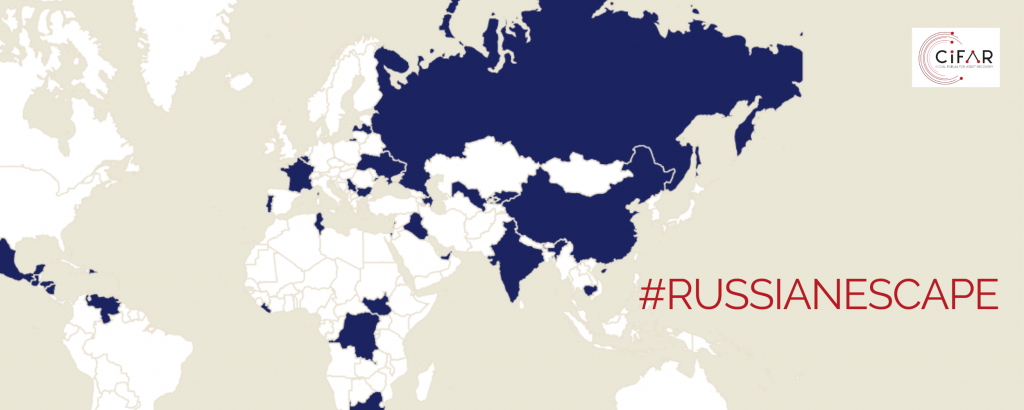Berlin, 26 June 2023

Today, investigative stories are being launched across Europe into the implementation of sanctions following the Russian invasion of Ukraine. The investigation was coordinated by CiFAR and the EIC (European Investigative Collaboration) with the support of OCCRP and thanks to IJ4EU and NED, and published by Mediapart (France), Info Libre (Spain), and Domani (Italy).
- Guerre en Ukraine : des familles d’oligarques russes échappent aux sanctions en France / Mediapart (FR)
- Living in luxury: how families of Russian oligarchs escape war sanctions in France / Mediapart (EN)
- Dalla Brianza alla Svizzera. Così l’oligarca salvò l’azienda / Domani (IT)
- Il mistero della lussuosa villa di Deripaska. È sequestrata, ma si può ancora affittare / Domani (IT)
- La sentenza Ue risparmia i parenti degli oligarchi russi (anche di Prigožin) / Domani (IT)
- Ecco il tesoro italiano degli oligarchi di Putin / Domani (IT)
- Salvare le ville dal sequestro. La strategia dell’oligarca di Putin / Domani (IT)
- Rompicapo sanzioni: il caso Superjet mette il governo davanti a un bivio / Domani (IT)
- Sigilli all’Eurallumina, la società dell’oligarca. Che farà il governo? (Domani IT)
- España ha embargado yates, mansiones y cuentas de oligarcas rusos por 1.023 millones de euros / Info Libre (ES)
- Magnates rusos sancionados maniobran en España para salvar sus bienes del embargo / Info Libre (ES)
- El ‘zar del aluminio’ burla la sanción de la UE alquilando su mansión de Cerdeña por 150.000 euros semanales / Info Libre (ES)
- Las tácticas de elusión de los oligarcas rusos cuestionan la eficacia de las sanciones europeas / Info Libre (ES)
- El oligarca con más bienes en Italia escapa del embargo de la UE ocultándose tras un trust de Bermudas / Info Libre (ES)
Sanctions were approved across the European countries, and elsewhere, successively from March 2022 and were designed to both target sectors of the Russian economy and individuals leading or providing support to the invasion. Several of those individuals are also suspected of involvement in corruption and of hiding their ill-gotten gains across the continent.
As Jackson Oldfield, Policy Director at CiFAR has stated:
Our joint investigation has shown that European governments, despite their commitment to ending the war, have undermined the effectiveness of their own sanction regimes. What is shocking, if unexpected, are that these weaknesses are ones that civil society has raised for years with respect to other sanction regimes.
Specific findings of the investigations include:
- Assets subject to Russian sanctions in Italy and Spain, previously unknown in total, amount to just over EUR 2 and 1 billion in assets respectively. These comprise largely of yachts and real estate.
- Potential sanctions evasion has been taking place in several cases through the transferring of assets to family members and this remains in any case a high risk for future sanctions evasion.
- Large disparities exist in how far European governments are going in providing information on sanctioned assets.
These weaknesses in the sanction regimes could easily have been avoided. According to Oldfield:
The ways to reduce the risk of sanctions evasion are to ensure that monitoring and oversight agencies are well resourced, that escape is minimised through tracking suspicious transactions, and that the media and civil society is empowered to support sanctions implementation.
This investigation shows that there is an urgent need to also better provide information on sanctioned assets across the board, otherwise this disparity in information risks some countries becoming hot spots for sanctions evasion where little public oversight exists.
Further, authorities in sanctioning jurisdictions should go beyond the sanctions themselves and launch investigations into the origin of those sanction assets and prosecute where crimes taking place in their jurisdictions have occurred.
Building on these investigations, sanctioning jurisdictions should:
- increase the resources they have dedicated to sanctions monitoring and oversight
- publicly provide information on sanctioned assets to allow for independent verification of sanction compliance by the media, civil society and members of the public
- ensure that sanctions are not evaded through the direct or indirect transfer of assets to family members and friends
- investigate and enforce any sanctions breaches found and, where they do not have effective legislation, introduce penalties for sanction breaches
- proactively open investigations into the source of sanctioned money and prosecute where a criminal offence is believed to have occurred.
Read the IJ4EU post on our stories here.
